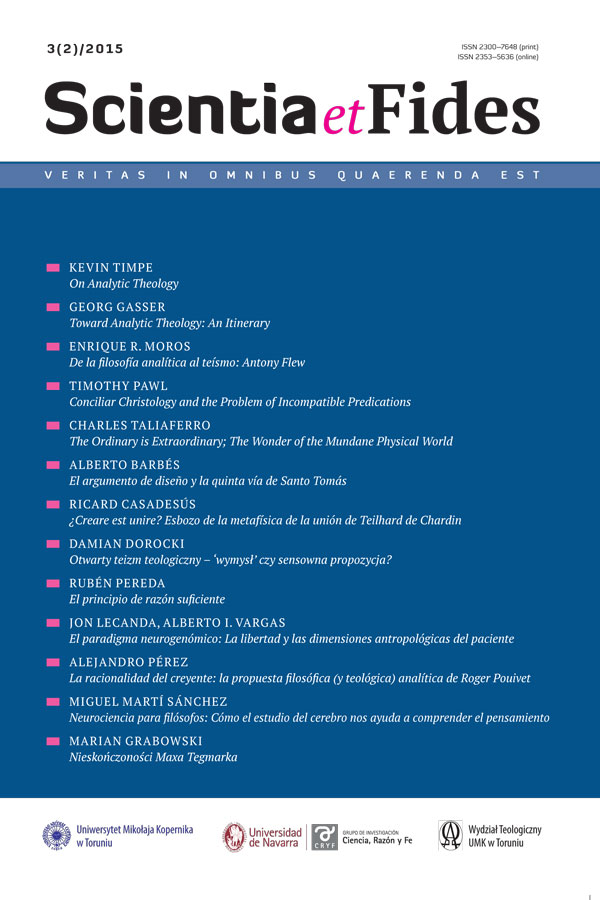El argumento de diseño y la quinta vía de Santo Tomás
Słowa kluczowe
fifth way, argument from design, finality, natural order, science, Intelligent DesignAbstrakt
The argument from design and Aquinas’ fifth way
In scientific literature it is common to make equivalence between the so-called argument from design and the fifth way of Thomas Aquinas. It is commonly assumed that both demonstrations for the existence of God are based on the concept of finality to proof the need for an intelligent being capable of causing order in nature. However, we think that the differences between the two arguments have great significance: each of them have as starting point a different type of order, are based on a different kind of finality, and the way in which they use the principle of causality is also different. We believe that such differences permit us to say that the two arguments are not at all comparable and may even be seen as opposite arguments.
Bibliografia
Aquino, Santo Tomás. Summa Theologiae.
Artigas, M. 1985. “Ciencia, finalidad y existencia de Dios.” Scripta Theologica 17: 151-189.
Artigas, M. 1992. La inteligibilidad de la naturaleza. EUNSA.
Artigas, M. 1999. La Mente del Universo. EUNSA.
Ayala, F.J. 2004. “Design without Designer. Darwin’s Greatest Discovery.” In Debating Design. From Darwin to DNA, edited by W.A. Dembski and M. Ruse, 55-80. Cambridge University Press: Cambridge.
Ayala, F.J. 2007. Darwin's gift to science and religion, Joseph Henry Press.
Behe, M.J. 2006. Darwin's black box: the biochemical challenge to evolution Free Press.
Behe, M.J. 2007a. The edge of evolution: the search for the limits of Darwinism. Free Press.
Behe, M.J. 2007b. “Darwin's Breakdown: Irreducible Complexity and Design at the Foundation of Life.” In Signs of intelligence: understanding intelligent design, edited by W.A. Dembski and J.M. Kushiner, 90-101. Brazos Press.
Carroll, W. E. 2003. La creación y las ciencias naturales: actualidad de Santo Tomás de Aquino. Universidad Católica de Chile.
Collado, S. 2007. “Análisis del Diseño Inteligente.” Scripta Theologica 39: 573-605.
Darwin, C. 1910. El origen de las especies por medio de la selección natural. F. Sempere y Compañía.
Dawkins, R. 2006. The God delusion. Houghton Mifflin.
Dembski, W. A. 2002. No free lunch: why specified complexity cannot be purchased without intelligence. Rowman and Littlefield.
Dembski, W. A. 2004. The design revolution: answering the toughest questions about intelligent design. InterVarsity Press.
García López, J. 1995. El conocimiento filosófico de Dios. EUNSA.
Haught, J. 2010. “Science, God and cosmic purpose.” In The Cambridge Companion to Science and Religion, edited by P. Harrison, 260-277. Cambridge University Press.
Hume, D. 1964. “Dialogues concerning natural religion.” In The philosophical works, vol. II, edited by T. Green and T. Grose. Scientia Verlag.
Martin, C. 1997. Thomas Aquinas: God and explanations. Edinburgh University Press.
Paley, W. 2008. Natural Theology, or, Evidences of the existence and attributes of the deity, collected from the appearences of nature. Oxford University Press.
Ratzsch, D. 2003. “Perceiving design.” In God and Design, edited by N. A. Manson, 124-144. Routledge.
Ratzsch, D., and J. Koperski. 2015. “Teleological Arguments for God’s Existence.” In The Stanford Encyclopedia of Philosophy, edited by E.N. Zalta. Spring 2015 Edition.
Rhonheimer, M. 2008. “Teoria dell'evoluzione neodarwinista, Intelligent Design e creazione. In dialogo con il Cardinal Christoph Schönborn.” Acta Philosophica 17: 87-132.
Ruse, M. 2006. Darwinism and Its discontens. Cambridge University Press.
Swinburne, R. 2004. The existence of God. Clarendon Press.
Pobrania
Opublikowane
Jak cytować
Numer
Dział
Licencja
CC BY ND 4.0. Posiadaczem prawa autorskiego (Licencjodawcą) jest Autor, który na mocy umowy licencyjnej udziela nieodpłatnie prawa do eksploatacji dzieła na polach wskazanych w umowie.
- Licencjodawca udziela Licencjobiorcy licencji niewyłącznej na korzystanie z Utworu/przedmiotu prawa pokrewnego w następujących polach eksploatacji: a) utrwalanie Utworu/przedmiotu prawa pokrewnego; b) reprodukowanie (zwielokrotnienie) Utworu/przedmiotu prawa pokrewnego drukiem i techniką cyfrową (e-book, audiobook); c) wprowadzania do obrotu egzemplarzy zwielokrotnionego Utworu/przedmiotu prawa pokrewnego; d) wprowadzenie Utworu/przedmiotu prawa pokrewnego do pamięci komputera; e) rozpowszechnianie utworu w wersji elektronicznej w formule open access na licencji Creative Commons (CC BY-ND 3.0) poprzez platformę cyfrową Wydawnictwa Naukowego UMK oraz repozytorium UMK.
- Korzystanie przez Licencjobiorcę z utrwalonego Utworu ww. polach nie jest ograniczone czasowo ilościowo i terytorialnie.
- Licencjodawca udziela Licencjobiorcy licencji do Utworu/przedmiotu prawa pokrewnego nieodpłatnie na czas nieokreślony
PEŁEN TEKST UMOWY LICENCYJNEJ >>
Statystyki
Liczba wyświetleń i pobrań: 1034
Liczba cytowań: 0



